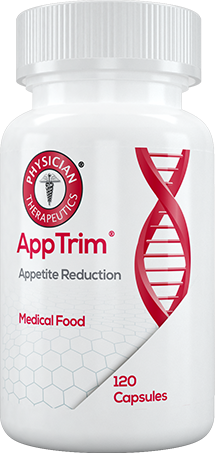AppTrim
AppTrim has been recommended by physicians for over 15 years as a natural tool to help reduce appetite and control food cravings. AppTrim plays an important role in the dietary management of obesity, and is an important component of any diet plan.
A Key Component of Prescribed Weight Loss Programs
Neurotransmitters are prevalent in the stomach and act as important mediators of hunger and satiety. These compounds are responsible for conveying information to regions of the brain that regulate energy balance. Imbalance of certain neurotransmitters will impact weight regulation, appetite and satiety.
Neurotransmitters and their amino acid precursors control appetite, satiety, and carbohydrate cravings. Obese patients often lack appropriate levels of amino acids and neurotransmitters that are responsible for controlling appetite, satiety, and carbohydrate cravings.
Safety Information
AppTrim is contraindicated in an extremely small number of patients with hypersensitivity to any of the nutritional components of AppTrim. Products containing L-tyrosine are contraindicated in those with the inborn errors of metabolism alkaptonuria and tyrosinemia type I and type II. Products containing tyrosine are also contraindicated in patients taking non-selective monoamine oxidase (MAO) inhibitors.
ADVERSE REACTIONS: Ingestion of L-tryptophan and/or choline at high doses of up to 15 grams daily is generally well tolerated. The most common adverse reactions of higher doses — from 15 to 30 grams daily — are nausea, abdominal cramps, and diarrhea. Some patients may experience these symptoms at lower doses. The total combined amount of amino acids in each AppTrim capsule does not exceed 400 mg.
DRUG INTERACTIONS: AppTrim does not directly influence the pharmacokinetics of prescription drugs. Clinical experience has shown that administration of AppTrim may allow for lowering the dose of co-administered drugs under physician supervision.

